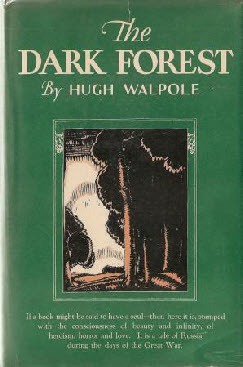The Dark Forest is considered by many one of Hugh Walpole’s best novels. On the surface, it’s easy to see why. It deals with the always relevant subject matter of the effects of war on life, society, and the human soul. Walpole, ever the sentimentalist, would seem to be the ideal choice to write a tear-jerker about life in the trenches of battle, in war-torn Russia during the First World War. But Walpole as a person and as an author, was hard to pin down, and his take on the anti-war novel is somewhat different than one would expect.
The book tells the story of John Durward and John Trenchard, two Englishmen who join a company of Russian doctors working on the Russian side of the Eastern Front during World War I. Durward, the narrator, is practical and open-minded, and is arguably a stand-in for Walpole himself, while Trenchard is a dreamy, clumsy, and naïve man, who Durward at first dislikes, then slowly starts to grow fond of, foibles and all.
Part war journal, part love-story between Trenchard and his enigmatic fiancé, Marie Ivanova, part meditation on the nature of friendship and sacrifice, The Dark Forest is one of Walpole’s darkest and least accessible books, at least during its first half, with Walpole indulging himself, with excessive detail and a too deliberate a pace. But once the myriad elements of psychological drama, harrowingly realistic war scenes, and Walpole’s mastery of setting and atmosphere, start to gel, the novel turns into something bordering on the sublime.
Although Walpole proves himself more than capable of depicting the grim reality of war, it’s not his main focus here, as he seems more interested in the psychology of his characters - especially Trenchard - and why they do the things they do. He delves into concepts of valor, motivation, and the effect of love, both romantic and platonic, on the unimaginative man. And as the story builds and the horror mounts, the book slowly transforms into a sort of existential dark dream that ends on a devastating note.
It’s not a perfect book, and, in my humble opinion, not even one of Walpole’s best, with the main character, Durward, coming off as cold and forgettable, and, as usual with Walpole, the psychology can get a little too simplistic and clumsy. But as is also usual with Walpole, there are passages, images, and truths that transcend time and place, and the writing is occasionally so heartfelt, so honest, that one has no option but to surrender to its beauty.
The Dark Forest is a flawed and fascinating book, and one which signaled Walpole’s growing fascination with Russia, about which he would write several books, all fueled by his harrowing experiences as a volunteer for the Russian Red Cross in the First World War.
Watch/Listen to review here:
Text © Ahmed Khalifa. 2022.
Ahmed Khalifa is a filmmaker and novelist. He is the writer/director of several short films and a feature, which was released on Netflix, and the author of a number of novels and short stories, including the YA horror novel, Beware The Stranger, available on Amazon. He is also the host of The Dark Fantastic Podcast. Find him on Twitter @AFKhalifa and on Facebook @Dark.Fantastic.AK·Writer


No comments:
Post a Comment